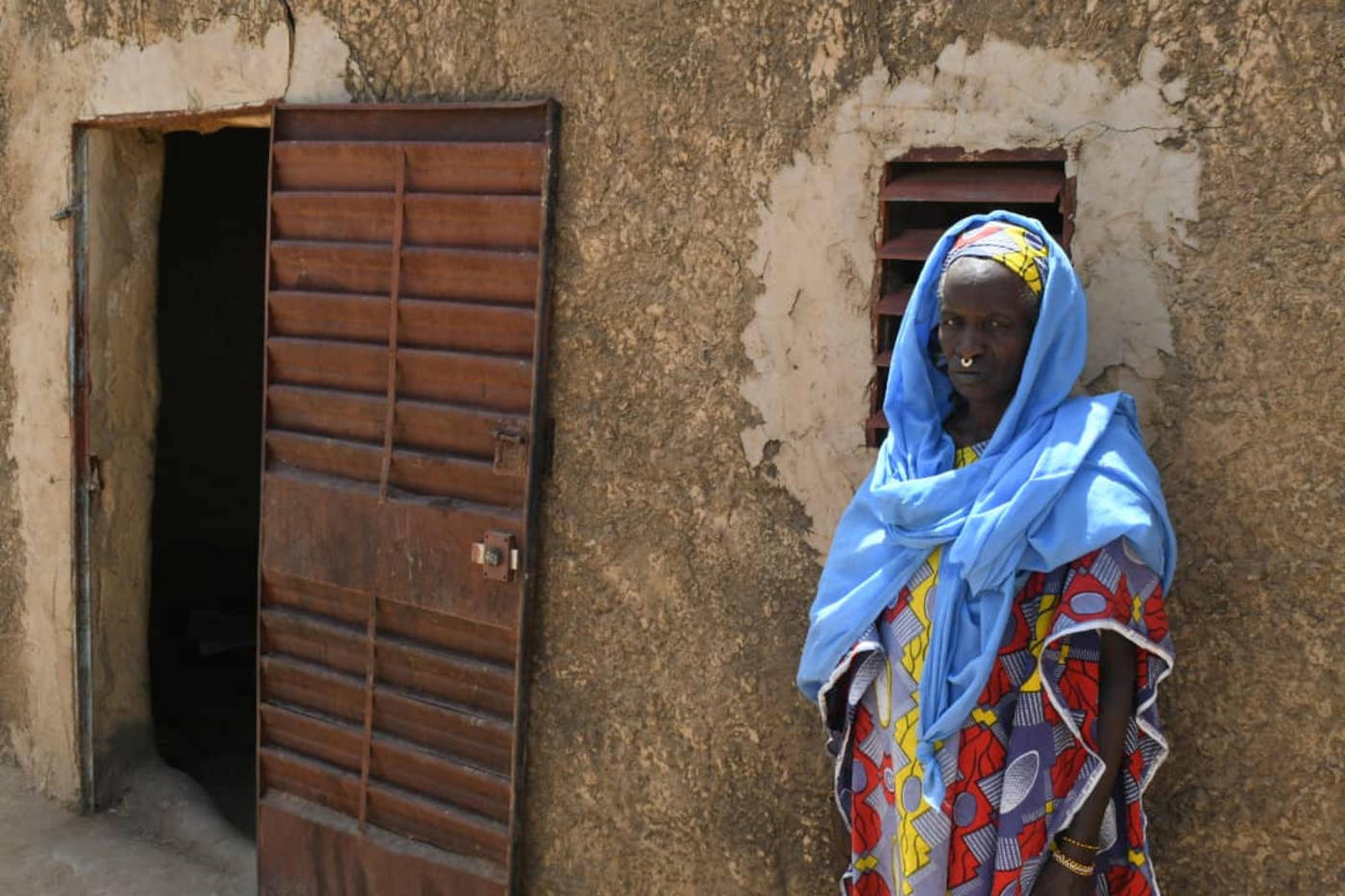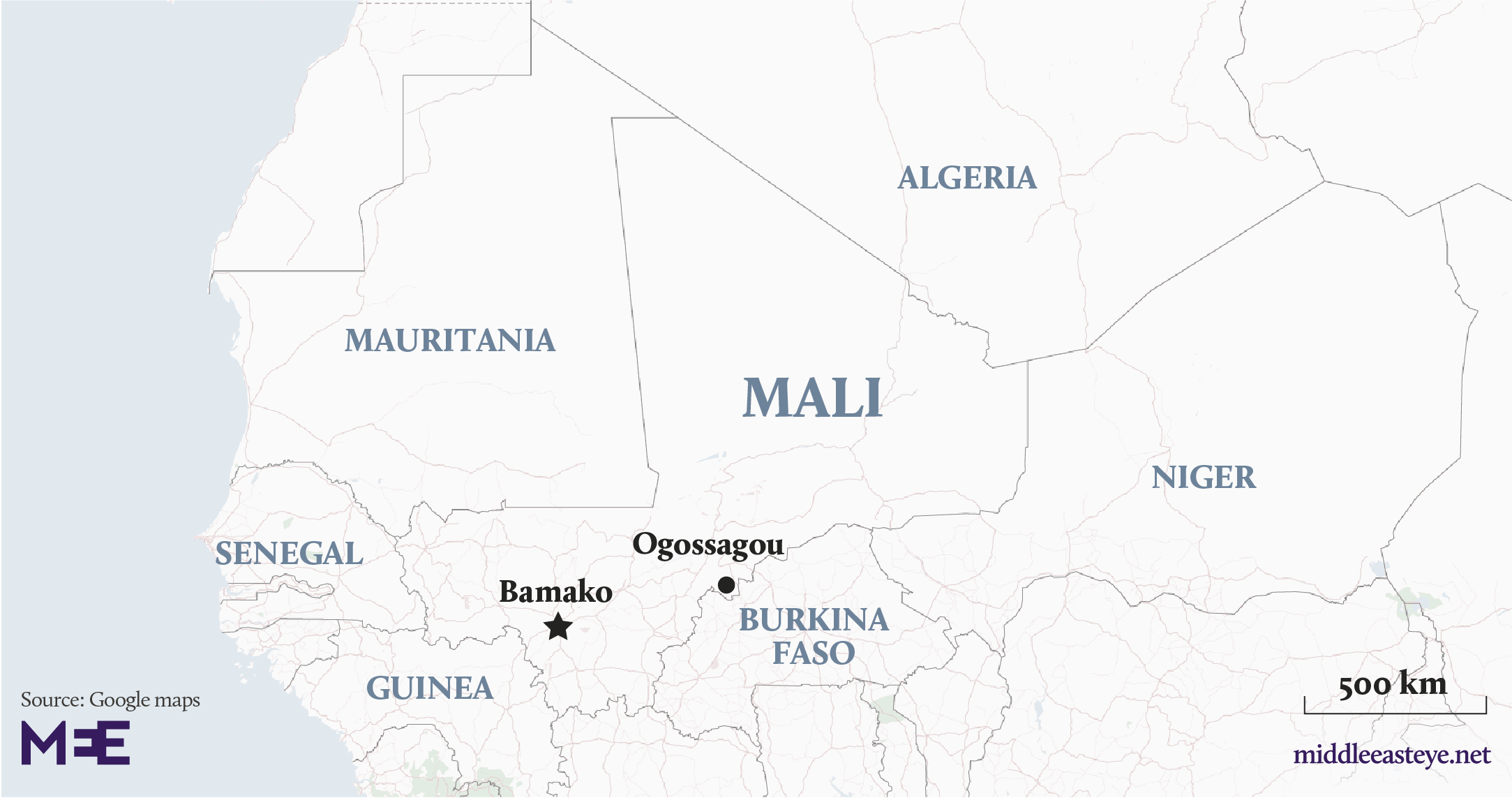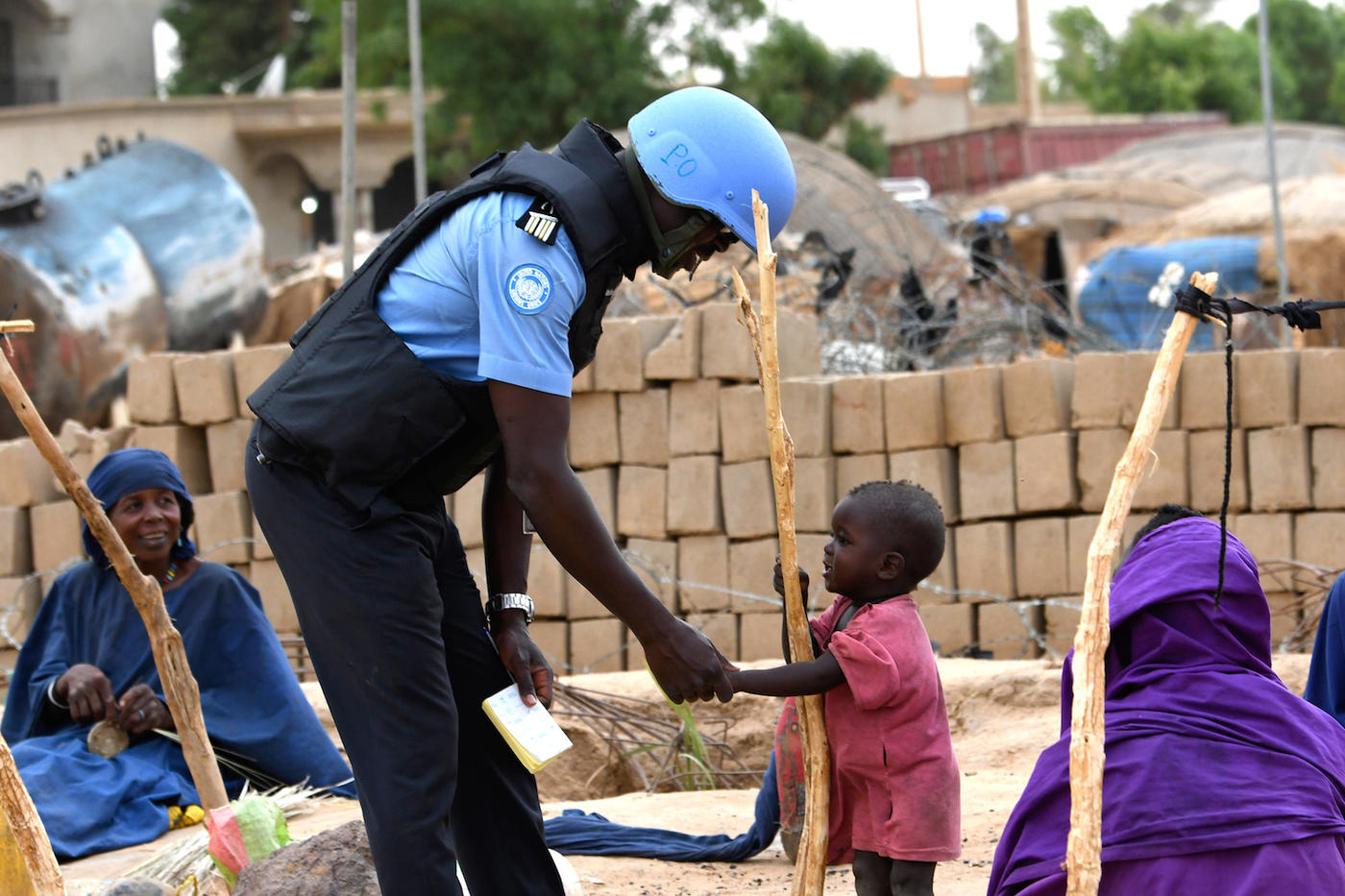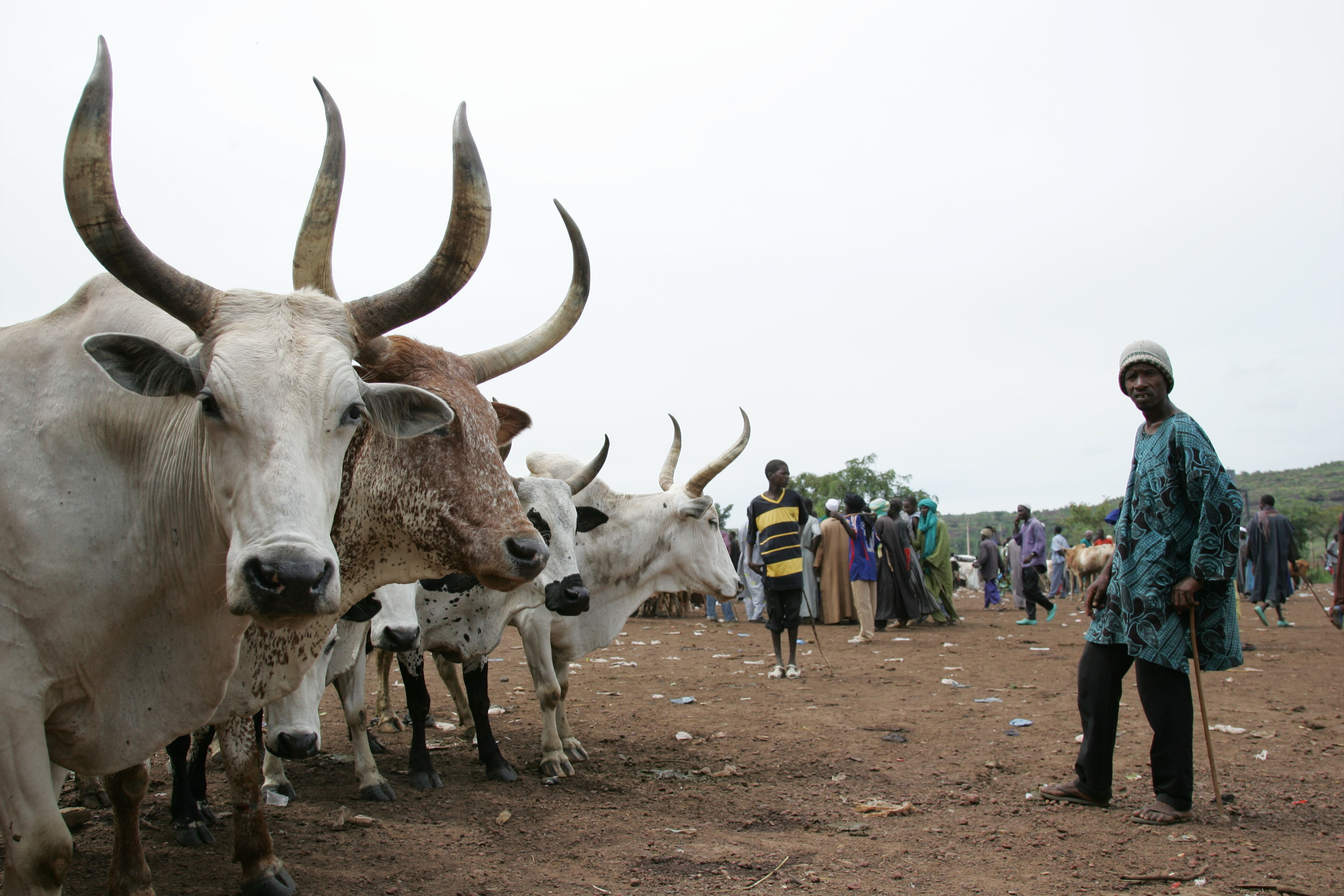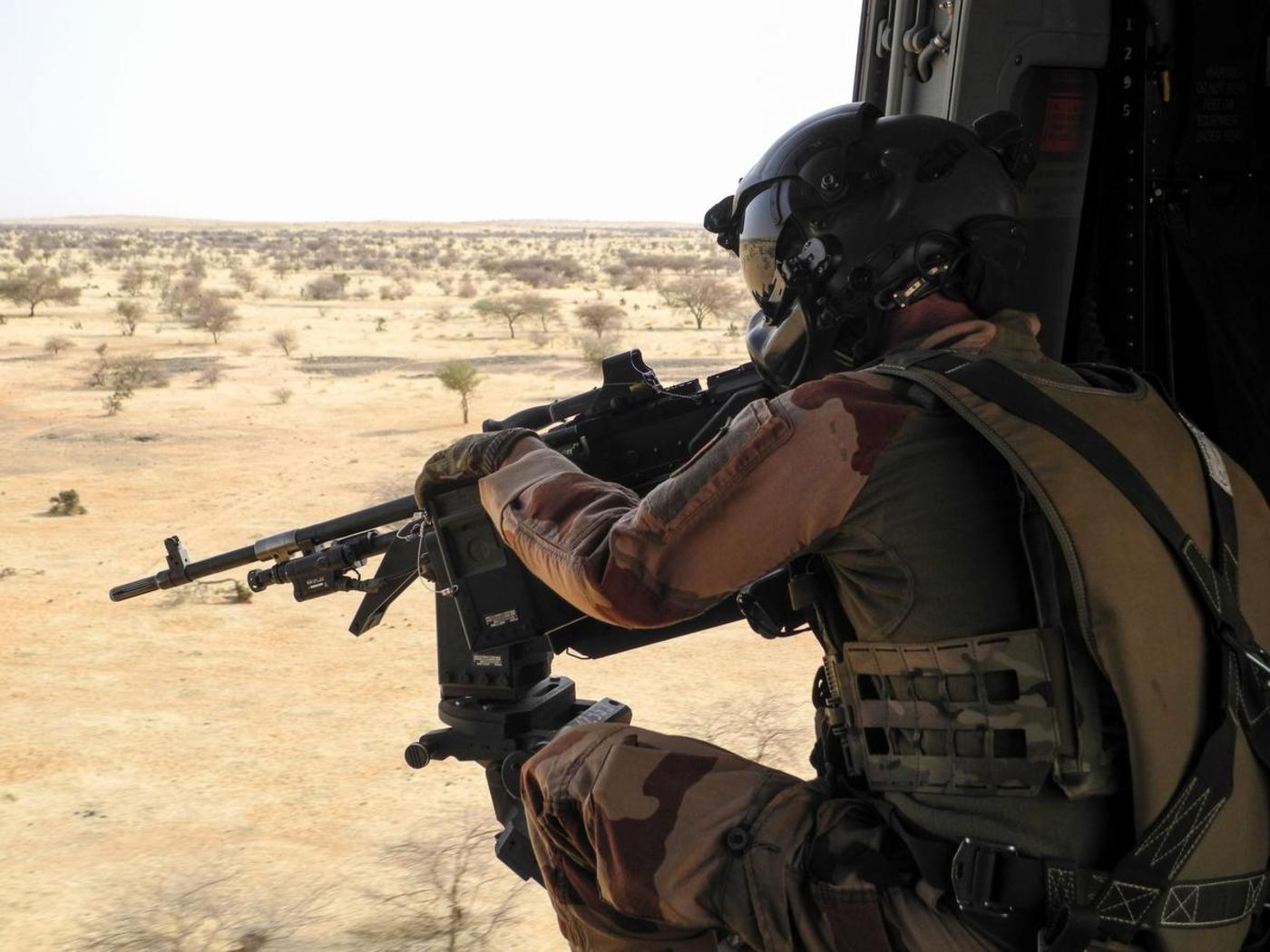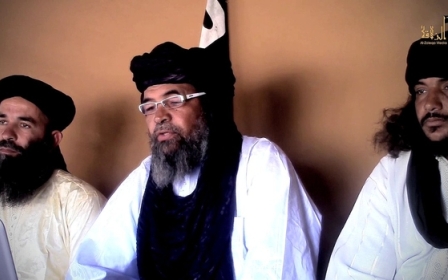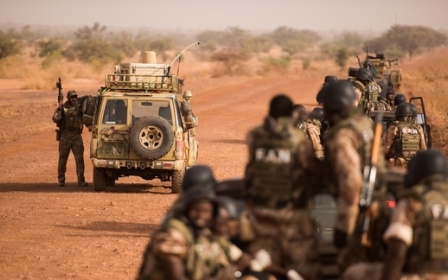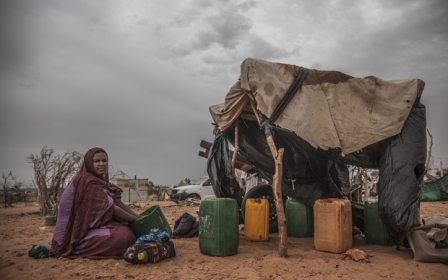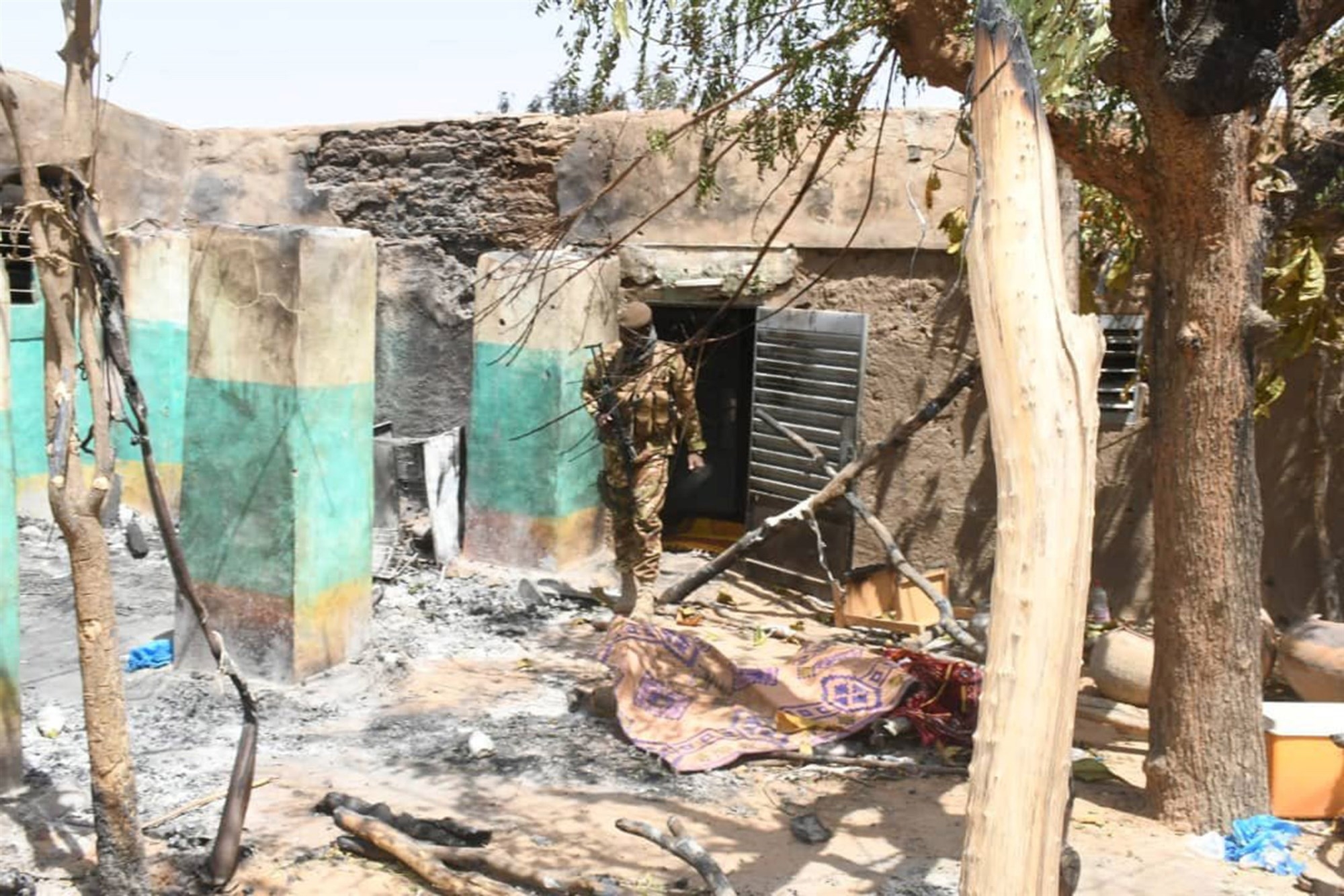
Massacre in Mali: How the 'war on terror' fuels tribal violence in the Sahel
A 10-day-old baby killed with its mother. People thrown into a ditch of burning oil before being fired upon. A village chief captured and summarily executed in front of his own mother.
Hamadoun Dicko, a Fulani leader from Mali, is speaking to Middle East Eye about the latest devastating attack on members of his ethnic group.
On 23 March, 160 people were massacred in the village of Ogossagou, in the Mopti region of central Mali. An armed militia of men belonging to the Dogon ethnic group came to inflict their terrible toll, razing huts and leaving behind the charred remains of Fulani women and children.
There is a genocide taking place against the Fulani community in Mali
- Hamadoun Dicko, Fulani leader from Mali
Dicko told MEE that he had lost nine members of his family at the hands of the Dan Na Ambassagou militia, and that he is now unable to return to his village for fear of death.
The attacks, UN rights office spokeswoman Ravina Shamdasani said, were "horrific".
Stay informed with MEE's newsletters
Sign up to get the latest alerts, insights and analysis, starting with Turkey Unpacked
"There were pregnant women and elders killed and they cut some people's throats and they burned alive others," said Dougoukolo Alpha Oumar Ba-Konare, a Paris-based analyst and teacher of Fulani societies at the French National Institute of Oriental Languages and Civilisations.
"It's heart-rending. You can see people being set in stone because of the way they were burnt. They burnt all the animals in that village."
Dicko and fellow Fulani leaders in Mali say this massacre is part of a "genocide" being waged against their community, which numbers almost three million in the African state.
It is the latest incident in a cycle of violence that has beset the region in recent years, increasingly focused on Fulanis, who are targeted partly because they are seen as being tied to armed al-Qaeda type groups operating in the region.
"Fulanis could be massacred everywhere in Mali," Dicko, a spokesperson for the Mali chapter of Tabitaal Pulaaku, which represents Fulanis across the world, said.
"There is a genocide taking place against the Fulani community in Mali. The Malian nation is in danger, and there is a strong probability that Fulanis could be massacred everywhere. They are no longer in security."
The violence comes as Mali's internationally backed military campaign against militant armed groups increasingly becomes a war on the Fulani, according to analysts.
The seriousness of the situation is underscored by a perfect storm of al-Qaeda linked groups vying for influence, army-backed militia with tribal scores to settle, and by a desperate struggle for water and land amid a looming climate catastrophe.
Tribes of the Sahel
There are some 40 million Fulani living across Africa, mainly in the Sahel, a semi-arid landscape that runs from East to West Africa - from the Red Sea to the Atlantic - and which lies at the southern edge of the Sahara desert.
While some occupy positions of power and privilege, many are poor and retain an age-old pastoralist tradition, roving with herds of horned cattle in search of fresh pasture and clean water.
The Dogon, a much smaller group, are concentrated in central Mali, where their elaborate mud homes can be seen perched high on a landscape of cliffs and sandy plateaux.
Both tribes are majority Muslim, though some Dogons practise traditional belief systems or Christianity.
In recent years, Dogons have formed armed militias, made up of bands of traditional hunters called Dozo, to protect themselves from attacks by al-Qaeda-linked fighters, which have attracted Fulanis in large numbers.
According to Ibrahim Yahaya from the International Crisis Group, Dogon militias now perceive Fulanis as "being in bed with the jihadists" and have attacked their villages indiscriminately.
"The fact that these groups have recruited more Fulani than everyone else has given them a Fulani identity," Ibrahim said.
"Sometimes the jihadists attack individuals who are Dogon, and the Dogon militias reply by attacking Fulani villages."
While there have historically been tensions between herders, generally from the Fulani tribe, and Dogon farmers, violence has been rare. The situation has taken a marked turn with the ascendancy in 2015 of armed groups inspired by extreme ideology in the region.
Among these groups is the Macina Liberation Front (MLF), led by Amadou Koufa, a local Fulani preacher who has travelled to the Middle East and Afghanistan, and who emerged unscathed earlier this month after reportedly being killed by French forces last year.
The MLF takes its name from the Macina Empire, anchored in central Mali, one of several Fulani Jihad states to dominate West Africa in the 19th century.
Responsible for attacks on government and army positions as well as on civilians from across the ethnic divide, the MLF seeks to overthrow the Malian state and establish rule according to an extreme interpretation of Islamic law.
It fights under the banner of Nusrat al-Islam, the official branch of al-Qaeda in Mali, which brings together several like-minded groups operating in West Africa and the Maghreb.
Groups linked to the Islamic State group are also known to operate in the region.
'They tap into grievances'
Religious rhetoric featured little in MLF's initial call to arms, broadcast via radio, often in the Fulani language, to remote communities.
Instead, Koufa tapped into the long-held grievances of local populations, many of whom were poor Fulani herders who felt marginalised by a government they saw as corrupt and exploitative.
"They tap into grievances to make their case that the government is corrupt, that communities are marginalised," said Ibrahim. "Once they capture people this way they then move onto the religious side."
A link between sub-Saharan Africa and the Arab world, Mali has long served as a crossroads of culture and trade. Ancient gold deposits have given rise to vast kingdoms. Timbuktu was once a great city of Islamic learning.
Major settlements, including Bamako and Segou, straddle the banks of the Niger, the principal river of West Africa, which cuts a crescent-like course through the landlocked country, providing a lifeline for millions.
Once a land of fabled riches, the country now ranks among the poorest in the world, coming in at 183 out of 187 countries in the UN's Human Development Index.
Living conditions in central Mali lag well behind national averages, fuelling grievances. The poverty rate there is estimated at around 60 percent, compared to 11 percent in the capital Bamako.
In response to the Mopti attack, the Malian government has fired military top brass and disbanded the Dan Na Ambassagou, a collection of Dogon self-defence groups made up of traditional hunters, which has been blamed for the attack.
These groups began to appear in 2016, as Dogons began to organise themselves in response to MLF attacks.
"Some Dogons became very weary of the Fulani and some militias started appearing asking for eviction of Fulanis from the whole region," said Ba-Konare, the Paris-based analyst.
Tit-for-tat attacks left scores dead.
Two alleged Fulani militants killed two men suspected of being informants for the Malian armed forces in 2016. Retaliatory attacks left 30 people dead on both sides.
In 2017, alleged Fulani armed assailants killed a prominent member of a Dogon hunting society, sparking retaliatory attacks by armed Dogons against Fulani villages. Thirty-five were left dead, forcing the evacuation of several thousand civilians.
There were pregnant women and elders killed and they cut some people's throats and they burned alive others
- Dougoukolo Alpha Oumar Ba-Konare, Fulani analyst
In 2018, the violence escalated. Human Rights Watch documented 42 incidents of communal violence in Mopti last year. A total of 202 civilians were killed, with 156 of them Fulani.
Villages were burnt to the ground, and the cutting of hands, feet and reproductive organs have become part of a cycle of gratuitous violence that led up to last weekend's attack, described by Ba-Konare as "the biggest and most nefarious".
On Friday, a Mali-based al-Qaeda affiliate claimed responsibility for a recent attack on a military base that left more than 20 soldiers dead.
The group said it was revenge for attacks against Fulani herders.
One Ogossagou resident told the Reuters news agency that the 23 March violence appeared to be in retaliation for the attack on the soldiers.
And so it goes on.
Heavy arms
Ba-Konare says that violence has been fuelled by a glut of arms that Dogon militia groups have been receiving from their tribal kin in neighbouring Ivory Coast and Burkina Faso.
"They possess heavy arms, rocket launchers, grenades, bulletproof vests. It's different from the warfare technology you can find in the region for the past two years," he said.
The country as a whole has become increasingly militarised as international actors establish themselves, seeking to stem the flow of migrants to Europe, amid growing fears over militant attacks.
The United Nations retains about 15,000 UN peacekeepers in Mali, which ranks as its most dangerous peacekeeping mission. The country hosts two European Union peacekeeping missions which provide military training to Malian forces.
The G5 Sahel – a partnership between Mali, Mauritania, Burkina Faso, Chad and Niger – launched a Joint Force in 2017 to "combat violent extremism".
General Thomas Waldhauser, commander of US forces in Africa, has described the G5 as "African-led, French-assisted, and US-supported".
The French also have 3,000 troops spread throughout the G5 countries, its former colonies, as part of Operation Barkhane, a counter-insurgency operation.
Covert American drones
Armed American drones, based at a sprawling base in Niger, are expected to take to the skies above the Sahel shortly, part of a covert US war being waged against suspected militants across the continent.
The regional troop surge comes amid fierce competition for raw materials, among them gold and uranium, attracting interest from the likes of Russia and China.
Yet these missions are often "heavily security focused" and fail to deal with the root causes of violence, according to Nadia Ahidjo from the Open Society Initiative for West Africa (OSIWA), one of the Open Society Foundations founded by Hungarian-American investor George Soros.
It's a military response to a problem that is not a military problem
- Nadia Ahidjo, Open Society Initiative for West Africa
"Many of these groups are actually set up to combat terrorism and so they do not see community conflict or social cohesion as an issue that they should target.
"You find that their mission is heavily security focused. It's a military response to a problem that is not a military problem."
Ba-Konare points out that counter-terrorism forces have a mandate to only track down "jihadist terrorist groups," allowing ethnic-based militias to act with impunity against the Fulani.
"In my opinion the militias are also terrorists, the way they fight and bring fear, they qualify as a terrorist group, but no one is treating them as such."
Rights groups have implicated the Malian army in a string of human rights abuses, including, extrajudicial killings, enforced disappearances and torture, as they go after alleged militants.
According to Ibrahim, the army has conducted counter-terrorism operations alongside elements of the Dozo militias and turned a blind eye on their attacks on Fulani communities.
This has served to reinforce Fulani grievances and the anti-government arguments of religion-inspired fighters who seek to recruit them, according to Ibrahim.
"The violence of the Malian army has reinforced the jihadist position that they are the ones protecting the Fulani."
Ba-Konare said that the Malian army had arrested hundreds of innocent people and have committed extrajudicial killing as they seek to burnish their credentials as part of a "war on terror".
"In the name of the war on terror they are trying to show an image of themselves of being really strong," he said.
"So you have an environment where anything can be justified in the name of the war on terror, when in fact the militias have killed more people than the jihadists have, many more people."
UN a 'witness to massacres'
The United Nations reacted quickly to the attacks: UNICEF provided medicine and first-aid supplies; the refugee agency UNHCR handed out "dignity kits"; beds and water sanitation items were offered by the World Food Programme. A team of the UN's own police force were sent to investigate the attack.
This ample response is reflective of the UN’s vast footprint across Mali, which includes one of its largest peacekeeping forces anywhere.
Yet Malian human rights groups say it is failing to protect civilians.
International forces are failing in their primary mission, which is to protect civilian populations
- Drissa Traore, National Coordinator of the Malian Association for Human Rights
"They are helplessly witnessing all these massacres," said Drissa Traore, national coordinator of the Malian Association for Human Rights, a group which documents abuses. "International forces are failing in their primary mission, which is to protect civilian populations."
Hamadoun Dicko, who described the attack on Ogossagou, said that Fulanis have been trying to raise the issue of inter-communal violence only to be told by the UN that it does not have the mandate to act. "We don't know why the UN is here because they are doing nothing and state that they have not got an order to act," Dicko said.
"It is strange to see how numerous they are here without any reaction," he added. "They are not taking our problem seriously enough."
Abou Dieng, officer-in charge at the Office of the United Nations Special Adviser for the Sahel, told Middle East Eye that the root causes of the situation needed to be addressed.
"Yes, there are some groups which are very violent, but we need to address the root cause of this crisis, and that has to do with economic activities, it has to do with access to food and water and access to education."
His office is tasked with implementing the United Nations Support Plan for the Sahel, tackling climate change, cross-border cooperation and empowering young people and women to achieve "shared prosperity and lasting peace" in the region.
He was not able to comment on concerns about UN peacekeeping operations, which are dealt with by a different department.
Scarcity of resources owing to climate change is an underlying factor in the conflict, he said. "Climate change has affected this part of the world, this is why the Sahel is prone to food insecurity. Now there is tension on the scarcity of resources," he said.
Herders and farmers
Dieng said that conflict between herders and settled farmers is a feature of the region. "There is huge tension in the Sahel between the two groups," he said.
As resources dwindle, Mali continues to experience exponential population growth. The country's population has more than doubled to 18.5 million in the past 30 years and today almost 50 percent of Malians are under the age of 15.
Droughts, increasing in frequency and intensity, have devastated the country in recent decades, killing thousands of people and millions of cattle.
This has been source of grave conflict in a country where almost 60 percent of people live in rural areas.
Fulani herders have been caught up in the competition for grazing spots and clean water, explains Nadia Ahidjo.
"Fulanis take their cattle from one end to the other based on grazing routes, and with climate change you have more and more arid areas," she said.
Added to this are disputes between settled farmers and herders, and conflicting narratives over land ownership and disputes which refer back to land arrangements made centuries ago between groups.
Separatist Tuareg
A rebellion by Tuareg separatists in 2012 inflamed ethnic tensions, driving Fulani herders into the hands of militant groups.
A nomadic people inhabiting the Sahara, Tuareg political leaders had long sought their own homeland free from marginalisation in Mali and neighbouring countries.
The Western-backed removal of Libya's Muammar Gadafi in 2011 was a turning point. With his demise Tuareg who had fought on his side as mercenaries returned home across the Sahara, bringing with them heavy weapons looted from Libya's armouries.
A year later, Tuareg separatists declared war against the Malian government, setting their sights on attaining independence for the northern region of Mali, known as Azawad.
The Malian government was promptly overthrown by mutinying soldiers vexed at its sluggish response.
Ansar Dine, an armed miliant group, began to wage war against the authorities, allying with the Tuareg-led separatists for a few months before both groups turned their guns on each other.
Ibrahim says that Fulani herders living in central regions adjoining the north now began to feel ill at ease by an emboldened Tuareg.
"They became vulnerable to acts by the separatist Tuareg who came to plunder their villages and steal their cows."
Seeking training and arms to protect their villages and cattles, some Fulani herders joined militant groups, such as Ansar Dine, which was mainly made up of Arabs and Tuareg, and did battle against government forces and separatist Tuareg, sometimes committing atrocities.
Troops from central Mali and other regions rushed North to quash the rebellion, leaving a power vacuum in their wake.
'People started killing each other'
A turning point for central Mali came in 2012, according to Ba-Konaré, when "pent up hatred" over a failing government, marauding rebel groups and an absent army finally boiled over into inter-communal violence.
Malian forces were able to regain a foothold in the country thanks to a French-led intervention in 2013 that saw rebels – both separatist Tuareg and "jihadist" inspired - expelled from their northern strongholds.
Separatists vanished into the Sahara's desert sands, beyond the reach of state forces, explains Ibrahim. But when Fulanis returned to their villages in central Mali, a vengeful army followed in hot pursuit.
"When the Malian army started to go back to regain control of territories they had lost to the jihadists, they persecuted those Fulanis who had joined those jihadist groups," Ibrahim said.
"The Fulani had initially joined the jihadists because they wanted to protect their communities. But the government considered them as jihadists."
Anxious for protection once again, some Fulanis in central Mali now flocked to militant groups, giving rise to entities such as the Masina Liberation Front.
Peace agreements signed in 2015 now brought former Tuareg separatists in from the cold and onto the side of the state, legitimising them as allies in the war against terror.
As part of its counter-terrorism mission Operation Barkhane, France turned to these legitimised separatists to identify targets in missions along an increasingly restive Mali-Niger border.
"Historically you have animosity between Tuareg and Fulani groups. When the French came they aligned themselves with Tuaregs to fight Fulanis. The Tuareg have taken advantage of this position to commit violence against their historical rivals," Ibrahim said.
Warnings and echoes
The Fulani leadership in Mali now fear their suffering has become normalised in the face of a powerful alliance of well-equipped militia and government forces, backed by international actors, united in the name of fighting terror, but in reality fighting against them.
Fary Silate, a veteran academic and president of the Senegal chapter of Tabital pulaku, which fosters solidarity between Fulani communities, has warned in a voice note message posted in a WhatsApp group that the Rwandan genocide and clan conflicts in Somalia provide telling example of where inter-ethnic violence can lead.
"It is dangerous to point out an ethnicity as a terrorist one," he said. "Rwanda and Somalia are examples that can show how these kinds of conflicts are dangerous."
Hamadoun Dicko says that Dan Na Ambassagou leaders move freely through the country and appear on television.
"If someone was not supporting them they would not disappear and reappear as they want and when they want," he told MEE. Dicko has asked for accountability for the attacks and has called on the international community for support.
"All that we want is justice," he said. "The international community must know that the Fulani community is not safe."
This article is available in French on Middle East Eye French edition.
Middle East Eye delivers independent and unrivalled coverage and analysis of the Middle East, North Africa and beyond. To learn more about republishing this content and the associated fees, please fill out this form. More about MEE can be found here.


